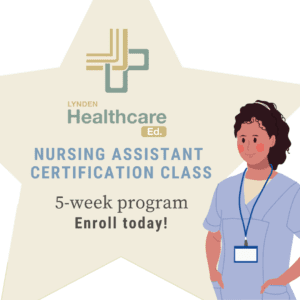In just five weeks, you could be well on your way to a new career, having completed the required 85 hours of CNA training to take your nursing assistant certification exam.
Between now and then, what can you do to help ensure that you perform as well as possible and have the success you desire? Below are a few tips for thriving during CNA training that we’ve learned through past classes here at Lynden Healthcare Education.
Get organized.
Take note of the daily schedule posted for your class and ensure you have the required clothing. Take care of the training materials you are given on the first day, and listen carefully for assignments and exams so that you know what to study and when. Also, be sure to give yourself plenty of time to get to class; arriving on time is an important part of being organized.
Practice.
“My primary motto is practice, practice, practice,” says Dianne Anderson, the instructor for LHE’s training program. “My experience has shown that practicing prior to the state test will greatly increase your chances of passing.”
Classes are divided into two sections: theory and skills. Every day, you’ll have both a theory test and some time to practice nursing skills with other students.
You also will have floor rotations in a local skilled nursing center (Christian Health Care Center in Lynden), where you’ll provide real-world care to residents and patients while practicing what you’ve learned in class.
Passing the state test requires being proficient in specific knowledge and abilities, and diligent practice is key to being able to perform well.
Ask for help.
Speaking of the state exam: “Passing the certified nursing assistant test in Washington state is not easy,” Anderson says. “It takes focus and determination.”

If you make a mistake in class or do poorly on an in-class exam, don’t fret. Talk to the instructor about how you can improve and strive not to repeat mistakes.
“As your CNA instructor, I promise to always give extra help when you need it,” Anderson says. “I ask that you invest in your future and give 100% effort in return.”
There’s no shame in asking for help. In fact, if you need help and don’t ask for it, you’re leaving effort on the table.
Listen.
Throughout the course, Anderson shares industry knowledge — gained from many years working in long-term care and teaching others to do the same — and helps nursing assistant students learn new skills. Listen to her proven tips and strategies; they are invaluable!
For students willing to listen and absorb knowledge, this CNA training class offers a phenomenal opportunity to learn from a nursing expert.
Anderson, an LPN, has been a clinical instructor of nursing at Whatcom Community College since 2009. She taught CNA classes at Christian Health Care Center from 2016 to 2022, prior to the program’s expansion and transition to operating under the direction of Lynden Healthcare Education.
Dianne is certified by the Association for Professionals in Infection Control and Epidemiology and works as an infection preventionist. She also coordinates medication audits for nursing staff and serves as a staff development coordinator in the long-term care industry.
Give 100%.
Lynden Healthcare Education’s CNA training program here in Whatcom County has been structured to ensure the best possible result for students who are willing to work hard. A great deal of learning and experience is packed into these five short weeks, and students who succeed will be those willing to expend the required effort. Be prepared to have fun, learn a ton and work hard.
Take care of yourself.
Remember, as noted earlier, it’s OK to ask for help. Paying attention to needs and seeking support, guidance or additional information is a critical part of self-care.
What else can you do to take care of yourself? Sleep, exercise and eat well. Oh, and drink lots of water!
Of course, sometimes even the demand to care for yourself can seem like too much. Remember that your instructor is there to help, and she really wants to see you succeed. So if you need anything, please feel free to let her know.




